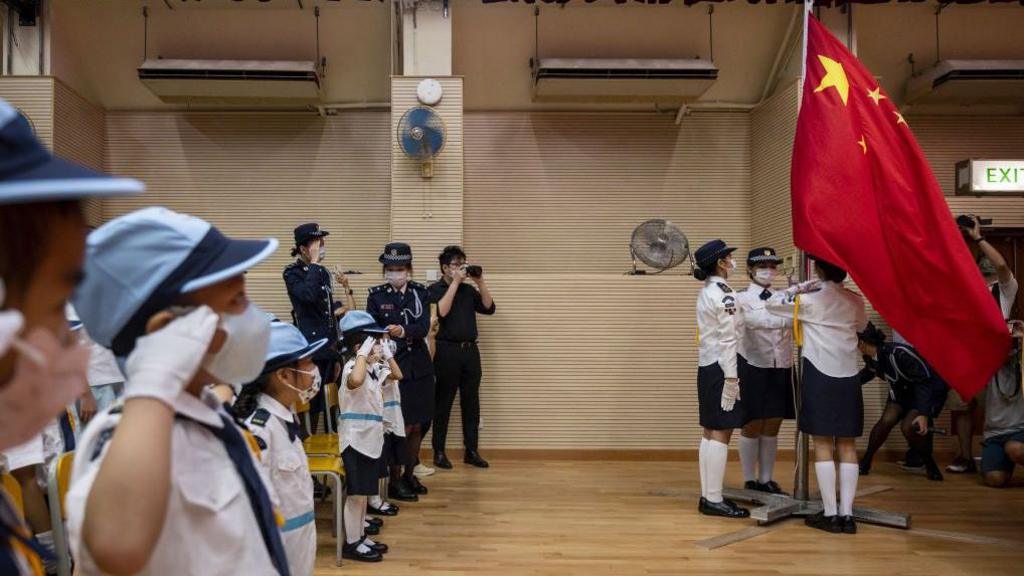School children sang anthem too softly - Hong Kong

Some schools were praised because their students "showed confidence in raising the national flag"
- Published
Hong Kong officials have singled out at least two schools for singing the Chinese national anthem "too softly".
Teachers at a third school have been asked to help students "cultivate habit and confidence" in singing it.
Hong Kong has redoubled the emphasis on "patriotic" education since 2020 when China cracked down on the city's pro-democracy movement.
Officials said students' voices at the Hong Kong and Macau Lutheran Church Primary School were "soft and weak" and "should be strengthened". At Yan Chai Hospital Lim Por Yen Secondary School, teachers were told to "help students develop the habit of singing the national anthem loudly in unison".
These comments appeared in a series of reports released by the city's education bureau after it inspected primary and secondary schools, and interviewed staff and parents.
Of the 20 schools whose inspection reports were published on the , at least six were advised to strengthen their curriculum focused on patriotic education.
The reports also praised some schools for taking students to mainland China, and because their students "showed confidence in raising the national flag".
In January, China implemented a law which requires schools, including those in Hong Kong, to include "patriotic education" in their curriculum and companies to do the same in their operations. The definition is vague but the curriculum is meant to promote the leadership and ideology of the Chinese Communist Party.
Beijing says the law is aimed at "unifying thoughts" and "gathering strength for building a strong country". But critics see it as yet another sign of Hong Kong's autonomy disappearing.
- Published19 March
- Published19 November
Many former opposition lawmakers and democracy campaigners have been jailed since 2020 under a controversial national security law that criminalised all forms of dissent. Despite international condemnation, Beijing defends the law as essential for stability.
In the years since, patriotism has become a byword for China's growing control of the city. It overhauled Hong Kong's electoral system with a "patriots' law" that barred those seen as "unpatriotic" from political office. More recently, it banned what has effectively been the city's unofficial anthem, a protest song called Glory to Hong Kong, because of its "seditious" possibilities.
The city has also set up a government committee to help "the new generation to really appreciate our Chinese culture, our Chinese history," Hong Kong's chief executive John Lee said.
The education bureau's latest efforts are seen as part of the same campaign.
In November last year, the bureau introduced a new subject which would require students as young as eight to start learning about the Beijing-enacted security law. It also covers "Chinese culture" and history that aligns with the Chinese Communist Party's vision.
"Students [should be] able to understand that Hong Kong has the advantage of enjoying strong support of the Motherland and being closely connected to the world, which helps them build up cultural confidence," read a circular published by the bureau in November.
Last month, the bureau also to "help [their children] learn the importance of safeguarding national security and enhance their national identity and national pride".